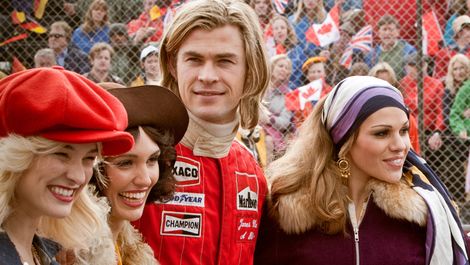Fast cars, glamorous girls and champagne a-flowing… Formula One has always been the sport with the most decadent vibe. More so than curling, anyway.
A world where brinkmanship is as common as wheel spins, where real danger lurks at every hairpin bend, it would seem fertile ground for a film. Particularly when your story zeroes in on the infamous rivalry between British driver James Hunt and his 1970s Austrian counterpart Niki Lauda – two wildly different characters united in their determination to win.
In the hands of Ron Howard, it’s a tale that could easily have gone awry; while he’s successfully documented real-life heroism before, in 1995’s Apollo 13 , he’s a director who, on occasion, gets dazzled by the superficial. The sour taste left by his recent Dan Brown outings – The Da Vinci Code and Angels & Demons – lingers, while his last film, 2011’s ill-advised return to comedy The Dilemma , is best forgotten.
Fortunately, Rush far exceeds expectations, emerging as one of the most rip-roaring rides of Howard’s career. Put this down in part to writer Peter Morgan. Whether it’s Blair/Brown ( The Deal ), HRH/Blair ( The Queen ), Idi Amin/his doctor ( The Last King Of Scotland ) or the two eponymous protags of the Howard-directed Frost/Nixon (2008), bringing two forceful figures head to head is Morgan’s speciality.
In 2010, Asif Kapadia’s Bafta-winning documentary Senna proved there is a thirst for F1 films, compellingly tracing the life and death of driver Ayrton Senna. Morgan winds the clock back further – to when driver safety finished a distant last.
But Rush is not a film for petrolheads (much as they’ll get a kick out of it). It’s a character study of two men – one brazen and cocksure, the other an early-to-bed obsessive – who were both mavericks of the track.
Party pooper
The Surrey-born Hunt (Chris Hemsworth) is the golden boy, the George Best of F1, driving in the red and white of McLaren. He’s a risk-taker – and a womaniser. “James can be a loose cannon,” we’re told, “but in terms of raw talent there is no better driver in the world.”
His opponent and polar opposite is Ferrari driver Lauda (Daniel Brühl); more analytical than Hunt, more mechanically-minded, a man who spurns the post-race partying that his playboy rival laps up. Briefly showing us the rise of both men, Morgan’s script primarily concentrates on the 1976 season, with Lauda defending the World Championship he won the previous year.
Students of F1 will know that it was a season that changed both their lives forever. But even if you go in armed with all the facts, Rush ’s immediacy will still have you sweating bullets.
Oddly, though, Rush almost stalls at the starting grid – the early scenes awash with 1970s fashions and mullets take some adjusting to. In particular, Aussie actor Hemsworth’s plum Home Counties accent briefly brings back nightmare memories of Tom Cruise’s ‘oirish’ lilt in Howard’s Far And Away .
But then, gradually, Rush shapes into a film that transcends a tale of ’70s excess and becomes one about dedication, honour, loyalty and sporting fellowship. There are no villains here, only heroes, and Morgan makes it clear early on that neither Hunt nor Lauda are as black-and-white as the chequered flag they chase.
Take Lauda, for example, and the scene where he and his wife-to-be Marlene (Alexandra Maria Lara) pick up two F1 fans whose car has broken down. Abruptly flooring the accelerator, Lauda shows that Hunt isn’t the only one capable of taking risks; suddenly, he feels like a worthy adversary.
That petrol emotion
But what really makes Rush purr is the final stretch, as Lauda contends with colossal odds, both physically and psychologically. Brühl has a knack for getting us to empathise with the unlikeable (see Inglourious Basterds ) and with each scene he increasingly makes you understand – and root for – his difficult character.
As brilliant as Brühl is, Hemsworth has just as tough a task. From seducing a nurse (Natalie Dormer) to his tumultuous marriage to model Suzy Miller (Olivia Wilde), he’s not always easy to side with (and Morgan’s script rather sidelines its female players). But there are several flashes of raw emotion here that balance the surface swagger.
Amid all this is a series of visceral racetrack scenes, brilliantly recreated by Howard and cinematographer Anthony Dod Mantle ( Slumdog Millionaire ), cut to a thumping Hans Zimmer score. In a YouTube world where we’re used to seeing footage of high-speed F1 crashes, that Rush still manages to sting us with these is testament to its craftsmanship.
Rarely has a feature film captured the intensity and exhilaration of motor sport so well. Rush is the word.
Verdict:
Utterly gripping. Aided by two punchy lead turns, an Oscar-worthy script and stunning in-car footage, Howard’s race film delivers top-gear drama. A piston- and heart-pumping triumph.





